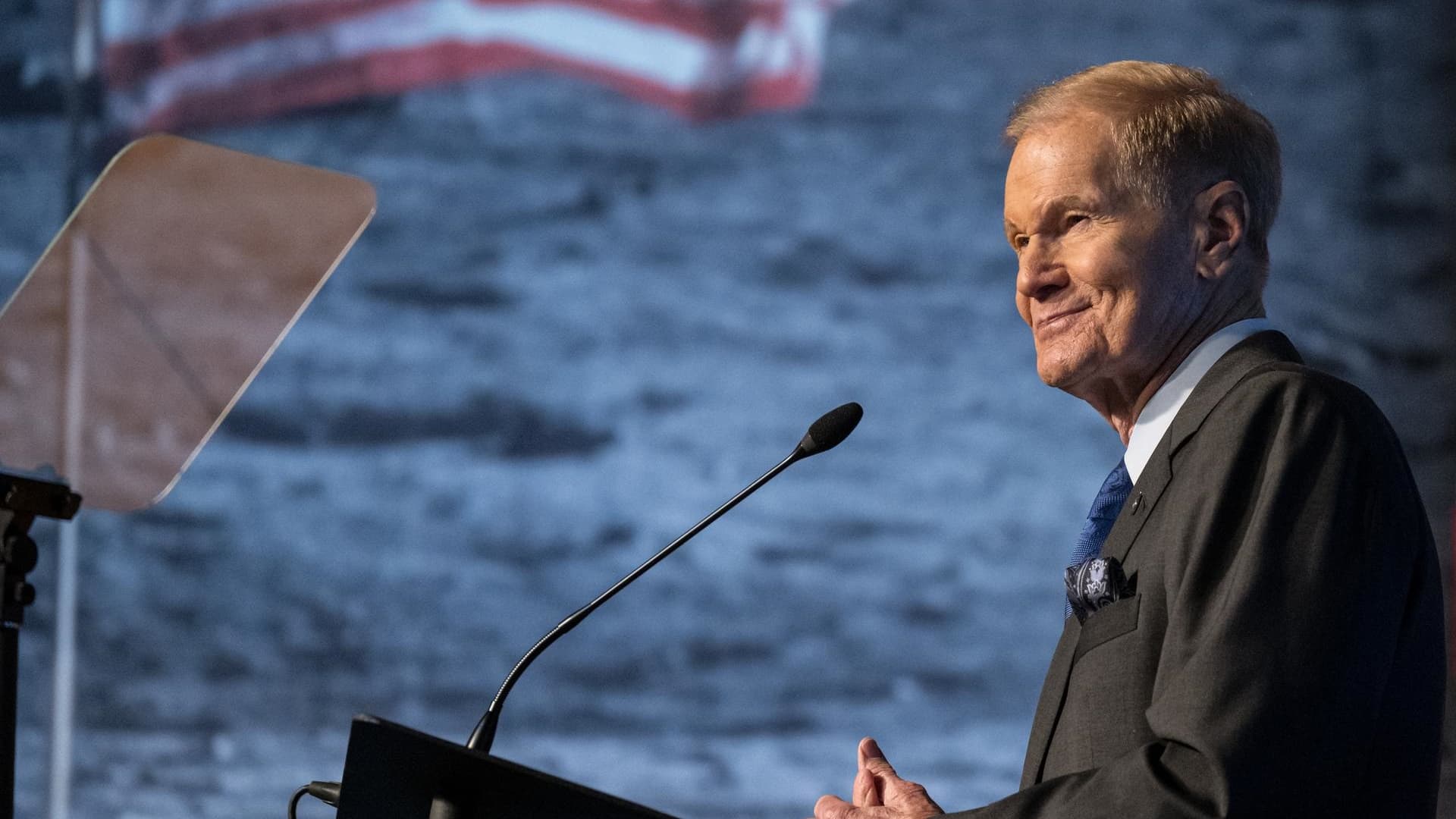NASA Administrator Bill Nelson discusses the agency’s goals during the annual State of NASA address on March 11, 2024.
Bill Ingalls / NASA
CNBC’s Investing in Space newsletter offers a view into the business of space exploration and privatization, delivered straight to your inbox. CNBC’s Michael Sheetz reports and curates the latest news, investor updates and exclusive interviews on the most important companies reaching new heights. Sign up to receive future editions.
Overview: Down round
The past week saw a one-two punch of U.S. budgets for federal space programs, with Congress passing the final spending bill for fiscal year 2024 (yes, it started in September) and the White House unveiling what agencies are requesting for fiscal year 2025.
With regard to NASA, the budgets make for some dismal reading. A year ago, the space agency was seeking budgets of $27.2 billion and $27.7 billion for 2024 and 2025, respectively. Now, more than $2 billion worth of those ambitions has been shaved off from each year – the agency’s final 2024 budget passed by Congress was $24.9 billion, and the 2025 request is now $25.4 billion.
So what’s losing out in the leaner budgets?
A quick look at what’s different between NASA’s budget plan for 2025 as of a year ago versus now reveals that the requests for three of its largest Mission Directorates – how its annual budgets are split up at the top end – were cut by between $200 million to $400 million, while its Deep Space Exploration Systems (effectively the Artemis program) is $513 million less. And then there’s the Science directorate, with nearly $900 million sliced off NASA’s prior 2025 ambitions.
The policy folks over at The Planetary Society specifically called out the ripple effect of the decreased 2025 request on NASA’s science efforts, pointing out the agency is “canceling, delaying, and pitting various missions against others for funding.”
“If these budgetary trends continue, no top-priority flagship missions will be possible within a balanced portfolio in any of NASA’s science divisions,” the independent space advocacy organization wrote.
Moreover, NASA’s budget remains a tiny fraction (less than 0.4%!) of what the U.S. government spends each year, despite its historical economic return-on-investment and continued popularity among taxpayers. Put simply, the request hampers an already comparatively miniscule agency’s budget at a time when global space ambitions are in a new era of expansion and exploration.
On the military side of things, the Space Force’s budget isn’t in as rough of shape. But the branch isn’t exactly enthused, with Air Force Secretary Frank Kendall giving the 2025 request an “acceptable” grade.
Space Force’s budget has already surpassed NASA’s, and the Pentagon is seeking $29.4 billion for the branch in 2025. That’s still a cut from the $30 billion the Space Force asked for in 2024. But two of the Space Force’s most significant programs for the space industry, NSSL (National Security Space Launch) and PWSA (Proliferated Warfighter Space Architecture), are still planning to buy from companies heavily in 2025, with $1.8 billion allocated for NSSL and $1.7 billion for PWSA development.
Overall, the federal budget’s allocations for space feel bizarrely at odds with the domain’s importance to the country, and muted in the context of geopolitical ambitions. Whether civil or military, space is increasingly a priority of governments around the world – but the latest funding plans of the most influential spacefaring nation doesn’t reflect that.
What’s up
- SpaceX’s Starship flies furthest spaceflight yet in a third test of the full prototype system. The rocket launched from the company’s facility in Texas and broke up above the Indian Ocean before its expected splashdown. Leadership of both SpaceX and NASA heralded the Starship flight as a success, with the rocket completing multiple new milestones on its orbital velocity journey. – CNBC
- Starlink customer count grows past 2.6 million, SpaceX disclosed in a blog post about improving the service’s latency for users. SpaceX claimed it’s reduced latency by about 30% due to performance improvements. – SpaceX
- SpaceX returns Crew-7 from the ISS, splashing down after six months at the International Space Station. – NASA
- It’s never aliens: Pentagon’s UFO report finds no evidence of extraterrestrials after a recent review of unexplained events. – NYT
- FCC signs off on satellite direct-to-device rules, approving companies to leverage terrestrial partners in providing coverage outside of cell towers. – SpaceNews
- SpaceX secures rights to use E-band spectrum, a conditional FCC approval for expanded frequency use of its Starlink satellites. E-band is an extremely high-frequency band of radio waves, which the company has previously said would enable its second-generation satellites to provide more network capacity. – SpaceNews
- Rocket Lab launches third Electron mission of this year: The vehicle carried Japanese imagery company Synspective’s StriX-3 satellite into orbit. – Rocket Lab
- Japanese company Space One’s rocket explodes in inaugural launch attempt, with its solid-fueled Kairos vehicle detonating just seconds after liftoff. Space One was aiming to be the first Japanese rocket company to deliver a satellite to orbit. – Reuters
- Ursa Major’s Hadley engine powers first hypersonic Stratolaunch test flight, which the companies announced was a success over the Pacific Ocean and reached speeds of nearly Mach 5. – SpaceNews
- SpaceX’s launch market dominance held strong in Q4, delivering 382 metric tons of spacecraft to orbit in the quarter. China’s launch efforts came in second, again. – BryceTech
Industry maneuvers
- Lunar mining startup Interlune raises $15 million in a round led by Seven Seven Six and joined by Aurelia Foundry Fund, Gaingels, Liquid 2 Ventures, and Shasta Ventures. The company, led by former Blue Origin executives Rob Meyerson and Gary Lai, are developing technology to extra resources such as Helium-3 from the moon’s surface. – CNBC / Interlude
- SAIC awarded $444 million Space Force contract, a five-year contract that will see Science Applications International Corp. work to modernize “launch range instrumentation” at Space Force sites in Florida and California. – SAIC
- BlackSky awarded $3.5 million AFRL contract ‘to develop and demonstrate moving target engagement services,’ an Air Force Research Laboratory deal that has a total possible award value of $24 million. – BlackSky
- Redwire signs Eli Lilly for second mission and plans to fly the next PIL-BOX to space on an upcoming cargo mission to the International Space Station. The company noted the PIL-01 mission’s experiment successfully “demonstrated that microgravity benefited insulin crystal growth,” so “Lilly researchers will use the PIL-02 mission to expand their understanding of crystal formulations and how they impact overall drug discovery and development.” – Redwire
- EchoStar adds Egypt’s Nilesat as a satellite ground system customer: The company purchased a Hughes JUPITER gateway and terminals for use with its Nilesat 302 satellite. The work is expected to be complete by the third quarter. – EchoStar
Market movers
- Redwire’s 2023 revenue came in at $244 million, up 52% from the prior year, according to the space infrastructure company’s Q4 report. For the quarter, revenue increased to $63.5 million, up 18% year over year, while it trimmed its net loss to $8.2 million, an improvement of 68% year over year. Redwire forecast slower revenue growth in 2024, expecting to bring in $300 million, which would be an increase of 23% year over year, but the company boasted a $373 million contract backlog at year end. – Redwire / Redwire
- Terran Orbital responds to Lockheed Martin takeover bid, as CEO Marc Bell says the company is still “looking at everything” in regards to the company’s future. – CNBC
- Astra is going private to avoid bankruptcy after co-founders Chris Kemp and Adam London signed an agreement with the company’s board to acquire all outstanding common stock at 50 cents a share. – CNBC
Boldly going
- Ken Peterman removed by Comtech as CEO and president, with the satellite communications company saying the firing was due to “conduct unrelated to business strategy, financial results or previously filed financial statements.” John Ratigan, Comtech’s chief corporate development officer, will serve as interim CEO. – Via Satellite
- Rick Bergman named president and CEO of Kymeta, as the company announced co-CEOs Walter Berger and Doug Hutcheson are retiring at the end of March. Bergman was previously AMD’s executive vice president for computing and graphics. Board member Nicole Piasecki was named Kymeta’s new chairman. – Kymeta
On the horizon
- Mar. 15: SpaceX Falcon 9 launches Starlink satellites from Florida.
- Mar. 18: SATELLITE 2024 conference in D.C. begins.
- Mar. 18: SpaceX Falcon 9 launches Starlink satellites from California.
- Mar. 20: Rocket Lab Electron launches NROL-123 mission from Virginia.






